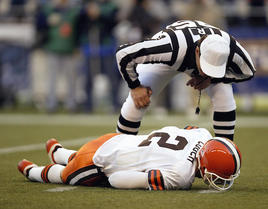 This past Sunday I spent time with our 7th graders during Sunday School to hang out, learn with them, and be blessed by an awesome couple who are serving there. When I came in several of them said "Mr Scott! You're in here today? Cool!" Now let me be worldly for a minute. That felt good. It's nice being "Mister" and to hear them glad to see me. OK, back to the post. In student ministry we can quickly buy into a "hero syndrome" if we're not careful. We become trusted leaders, confidants, counselors, and mentors for an entire generation of students. Because so many times our students run to us, we can buy into a syndrome that says "they need me more than they need _____" (the blank can be parents, teachers, older siblings, coaches, pastors). Also, when we first enter a ministry season we can come in with all the answers, ideas, and motivation. We're like the brand new quarterback taken in the draft who the ownership and fans look at as the answer to the team's woes. And in so many of those situations, what's being peddled is a false hope because no one person can match up to all the expectations put on them. How can we avoid the hero syndrome in student ministry? Here's 6 ways: 1) Don't make it about you - Your ministry is not about you. And it never should be. If the student ministry you're leading could not survive without you, you're doing it wrong. The best way to not make it about you is to build up, elevate, and brag on the volunteers and adult leaders serving alongside you. Put them in the best place to succeed and serve well. 2) Be the champion for parents - Teenagers and toddlers are pretty similar, they divide and conquer. If they don't like what their parents say or make them do, they will come to you to take their side. I've learned (the hard way sometimes) the best thing to always do is point back to mom & dad and encourage your student to live out Ephesians 6:1 "Children, obey your parents in the Lord, for this is right." They are the ones who have been given the task of raising their children, not you. 3) Don't be a secret keeper - A hero syndrome comes when a student ministry leader becomes the keeper of student secrets. It's not a bad thing in itself when they confide in you and follow it with "but hey, don't tell anyone about this." In some ways we need to protect confidentiality (for example don't post on Facebook who you're meeting with and why), but we're under no obligation morally or legally to hide things from the authorities or their parents. Whenever a student meets with me and says they need to confess some sin, I always ask if they've talked to their parents about it, and if they've not I volunteer to go with them. 4) Don't promise the moon - The reason why false hope gets peddled and believed in football is because we get all these promises from coaches and athletes that <insert cliche about winning>. We do the same when we make huge promises early in our ministry that we know we can't deliver on, but they sound good because they're what people want to hear. Be realistic about what kind of objectives you're setting. 5) Be accountable - The worst thing that can happen to a leader in any ministry is a failure to be held accountable. Not a brow-beating accountability, but the regular reality check we all need to kill our sin and grow in our faith. If we don't have that, we'll buy into the hero mentality that says "Well who do I really answer to anyway... God. So I don't need anyone else to tell me what to do." That attitude is a recipe for disaster. The best advice I can give for student ministers is to be discipled by an older believer or by your pastor. Don't wall yourself off from others in your life. 6) Network - When we get around others in ministry, I believe it serves two great purposes: It gives us the encouragement to keep pressing on, and it gives us the relief that we're not the only ones struggling to figure it all out. I went to a pastors conference a few years ago at a megachurch with an internationally known pastor. Their student ministry did a breakout session and we all went in trying to figure out what the "magic touch" was that they did. We were all encouraged, relieved, and laughing when their leadership looked at each other and said "we teach the Bible, we spend time together, and we serve."
0 Comments
Leave a Reply. |
Scott M. DouglasA blog about leadership and the lasting legacy of family ministry. Archives
August 2023
Categories
All
|
 RSS Feed
RSS Feed



